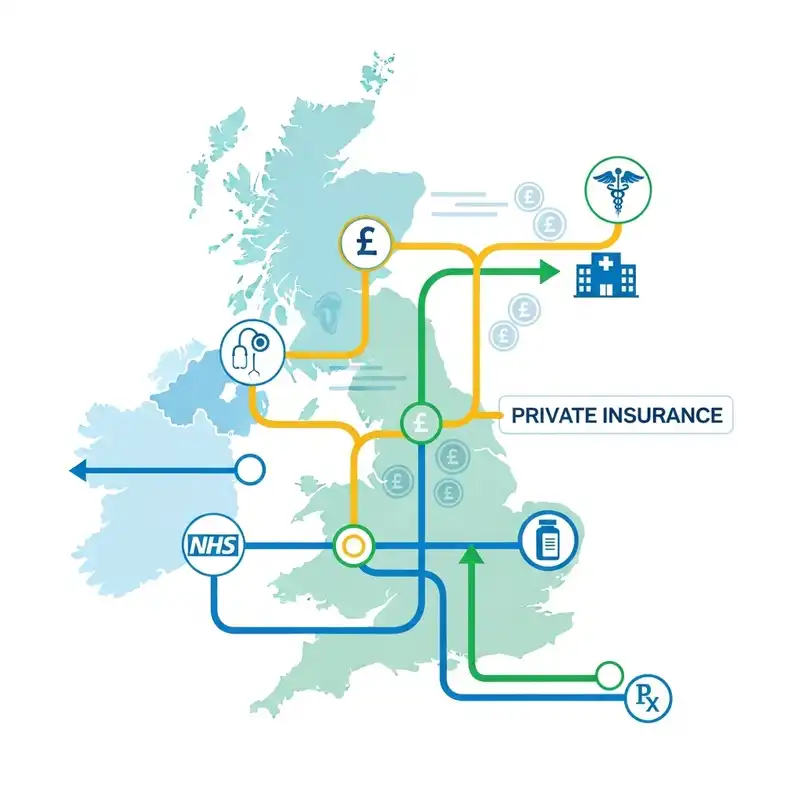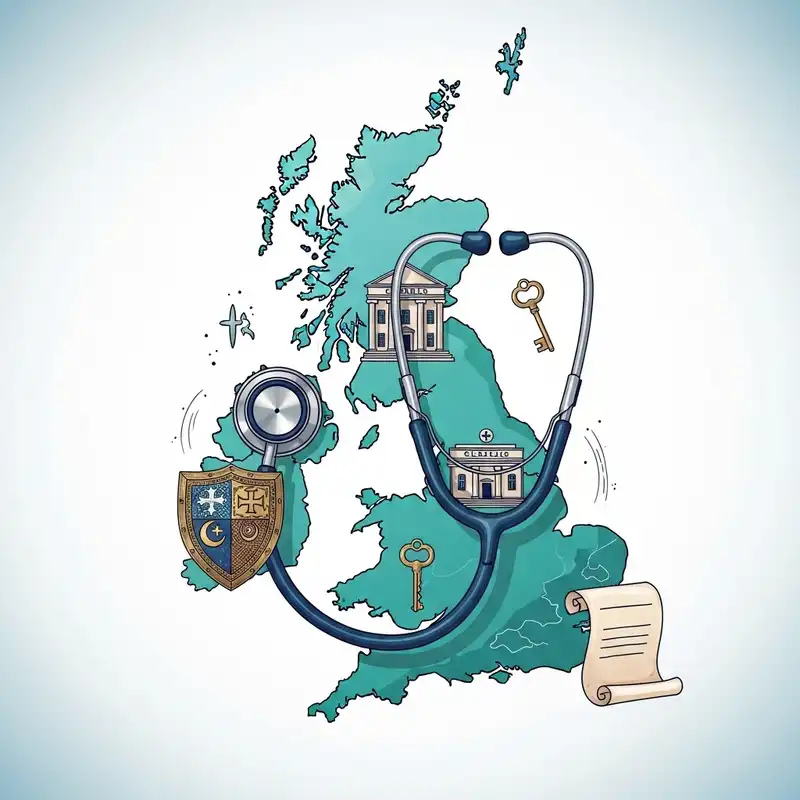Future-Proof Your Life: The Ultimate Growth Hack

In a world obsessed with growth – scaling businesses, climbing career ladders, optimising our fitness, and expanding our minds – we often overlook the very foundation upon which all progress is built: our resilience. We invest in stocks, but not in our ability to earn. We plan for holidays, but not for recovery. We build dream homes, but neglect the scaffolding that keeps them standing when the storms of life hit.
This is the great paradox of modern ambition. We are so focused on the ascent that we forget to secure our footing.
But what if the ultimate growth hack wasn't a new productivity app or an investment strategy? What if it was something far more fundamental? What if it was the deliberate, strategic act of building a fortress of protection around your life, your health, and your family?
The 2025 Resilience Blueprint: Why Strategic Protection – From Personal Sick Pay for Electricians and Nurses to Private Health Access and Family Income Security – Is The Overlooked Cornerstone of True Personal Growth, Unbreakable Relationships, and Achieving Your Dreams, Even As Projections Show 1 In 2 People Facing Cancer In Their Lifetime.
Welcome to the 2025 Resilience Blueprint. This isn't about fear; it's about foresight. It's about recognising a stark reality, backed by sobering data from institutions like Cancer Research UK, and transforming that knowledge into empowerment. It’s about understanding that financial and personal security are not just defensive measures; they are the launchpad for your boldest ambitions.
When you know your income is secure, you can take calculated career risks. When you know your family won’t suffer financially if you’re gone, your relationships deepen. When you know you have a plan for a health crisis, you can live more freely and fully today.
This is not just insurance. This is the architecture of a future-proof life.
The Shifting Landscape of Risk in 2025
The world we navigate today is fundamentally different from that of a generation ago. The traditional safety nets are fraying, and new vulnerabilities have emerged. To build a resilient future, we must first understand the ground beneath our feet.
1. The Pressure on Our NHS: The National Health Service is a national treasure, but it is under unprecedented strain. As of early 2025, waiting lists for routine treatments remain stubbornly high, with millions of people in England waiting for appointments. This isn't just an inconvenience; for someone unable to work due to a treatable condition, a long wait can become a financial catastrophe.
2. The Inadequacy of State Support: If you fall ill and are unable to work, the Statutory Sick Pay (SSP) provided by the government is, for most, a drop in the ocean. At just over £116 per week in 2025, it's unlikely to cover the mortgage, let alone the weekly food shop and utility bills. For the UK's burgeoning self-employed population – now numbering in the millions – there is no SSP at all. You earn nothing from day one.
3. The New World of Work: The rise of the gig economy, freelancing, and contract work offers flexibility but sacrifices security. The days of a 'job for life' with a generous sick pay scheme and death-in-service benefits are a relic of the past for a significant portion of the workforce. You are your own safety net.
These factors create a perfect storm of risk. Your health is your greatest asset, and your ability to earn an income is the engine that powers your entire life. Without a robust plan to protect them, your personal growth, financial plans, and family's wellbeing are built on shaky ground.
The Foundation of Resilience: Securing Your Income
Everything starts with your income. It pays the mortgage, puts food on the table, funds your children's future, and fuels your dreams. If that engine stops, everything grinds to a halt. This is why Income Protection is the bedrock of any resilience blueprint.
Income Protection: Your Personal Salary in a Crisis
Income Protection (IP) is arguably the most important insurance you can own. It's designed to do one simple, vital job: pay you a regular, tax-free monthly income if you are unable to work due to any illness or injury.
- How it Works: It replaces a significant portion of your gross salary (typically 50-70%) and pays out after a pre-agreed waiting period, known as the 'deferred period'. This could be 4, 13, 26, or 52 weeks – you align it with any sick pay you receive from your employer or how long your savings could last.
- The 'Own Occupation' Gold Standard: The best policies use an 'own occupation' definition of incapacity. This means the policy will pay out if you are unable to do your specific job. Other, less robust definitions might only pay if you're unable to do any job, which is a much harder threshold to meet.
- Duration of Payout: An IP policy can pay out for a set period (e.g., 2 or 5 years) or, ideally, right up until you are able to return to work or you reach retirement age. A long-term illness could mean decades of lost income, and a full-term policy is the only way to truly protect against that.
Personal Sick Pay: The Essential Cover for Hands-On Professionals
For those in physically demanding roles or the self-employed who need a more straightforward, short-term solution, Personal Sick Pay insurance is a game-changer. It's often structured with shorter deferred periods (even just one week) and shorter payout periods (typically one or two years).
This makes it an ideal fit for tradespeople, nurses, and other high-risk professions.
Spotlight: The Electrician & The Nurse
Consider an electrician. Their livelihood depends on their physical dexterity, eyesight, and mobility. A fall from a ladder resulting in a broken wrist, or a back injury, could mean months off work. For a self-employed electrician, that’s months with zero income.
Similarly, a nurse is on their feet all day, performing physically and emotionally demanding tasks. Burnout is a significant risk, as are musculoskeletal injuries. An extended period of illness means relying on NHS sick pay, which often reduces after a set period, before dropping to SSP.
Let's compare the stark reality of relying on the state versus having a personal plan:
| Scenario: Self-Employed Electrician, Off Work for 6 Months | State Support (Universal Credit) | Typical Personal Sick Pay Policy |
|---|---|---|
| Monthly Income | Potentially £300-£500 (Means-tested) | £2,000 (Tax-free) |
| Waiting Period | At least 5 weeks for first payment | 1 or 4 weeks |
| Financial Impact | Severe financial stress, debt | Bills are paid, stress is minimised |
| Focus | Worrying about money | Focusing on recovery |
Executive Income Protection: A Smarter Way for Company Directors
If you're a director of your own limited company, Executive Income Protection is one of the most tax-efficient ways to secure your salary and dividends. The key difference is that the company pays the premium, not you personally.
- Tax Efficiency: The premiums are typically treated as a legitimate business expense, making them tax-deductible against corporation tax.
- Benefit Payout: If you claim, the benefit is paid to the company, which then distributes it to you via PAYE, ensuring business continuity.
- Higher Limits: This type of policy often allows for higher levels of cover than a personal plan, protecting not just salary but also dividends and P11D benefits.
Beyond Income: Protecting Against Life's Biggest Shocks
While a steady income provides stability during a period of illness, some events create an immediate and overwhelming financial shockwave. This is where lump-sum protection policies form the next layer of your resilience blueprint.
Critical Illness Cover: Financial Breathing Space When You Need It Most
Imagine receiving a diagnosis of cancer, a heart attack, or a stroke. Amid the emotional turmoil, the last thing you or your family need is financial worry. Critical Illness Cover (CIC) is designed to prevent this.
It pays out a one-off, tax-free lump sum on the diagnosis of a specified serious condition. The 'big three' – cancer, heart attack, and stroke – are always included, but modern policies can cover over 50 different conditions, including things like multiple sclerosis, major organ transplant, and Parkinson's disease.
That sobering projection from Cancer Research UK – that 1 in 2 people born after 1960 will get cancer – highlights why this cover has become so vital. The lump sum can be used for anything, providing total flexibility:
- Clear your mortgage or other debts.
- Pay for private medical treatment or specialist care.
- Adapt your home (e.g., install a ramp or stairlift).
- Replace lost income for a partner who takes time off to care for you.
- Simply give you the financial freedom to focus 100% on your recovery.
Life Insurance: The Ultimate Act of Love for Your Family
Life insurance is the fundamental promise you make to your dependents that they will be financially secure, even if you're not there. It's not for you; it's for them. The peace of mind it provides is immeasurable.
There are three main types to consider:
| Type of Cover | What It Does | Best For |
|---|---|---|
| Level Term Insurance | Pays a fixed lump sum if you die within a set term. | Covering an interest-only mortgage, providing a financial legacy for young children, or covering potential inheritance tax. |
| Decreasing Term Insurance | The payout amount reduces over time, usually in line with a debt. | Covering a repayment mortgage. It's the most affordable type of life cover. |
| Family Income Benefit | Pays a regular, tax-free monthly or annual income to your family until the policy term ends, rather than a single lump sum. | Replacing your lost salary in a manageable way for your family, preventing them from having to manage a large, intimidating sum while grieving. |
Choosing the right type and amount of cover is crucial. A good starting point is to calculate your mortgage, any outstanding debts, and then estimate the ongoing costs your family would face. This is where talking to an expert can make all the difference. At WeCovr, we help families navigate these choices every day, comparing options from across the UK market to find a solution that provides complete peace of mind.
The Business Angle: Fortifying Your Enterprise
For business owners and company directors, your personal resilience and your business's resilience are intrinsically linked. Protecting one means protecting the other.
Key Person Insurance: Protecting Your Most Valuable Asset
Who is the most critical person in your business? Is it the founder with the vision, the sales director who brings in all the revenue, or the lead developer with the unique technical skills?
Now, what would happen to your business if that person were suddenly unable to work due to death or critical illness?
This is the risk that Key Person Insurance is designed to mitigate. The business takes out a policy on that key individual. If a claim is made, the policy pays a lump sum directly to the business. This cash injection can be used to:
- Cover the cost of recruiting a replacement.
- Repay business loans.
- Reassure investors and lenders.
- Make up for the anticipated loss in profits or revenue.
Without it, the loss of a key person can be a fatal blow, especially for a small or medium-sized enterprise (SME).
Relevant Life Cover: A Director's Best-Kept Secret
A Relevant Life Policy is a tax-efficient death-in-service benefit set up and paid for by a company for an individual employee or director. It's a fantastic alternative to a group scheme for smaller businesses.
- Tax Advantages: The company-paid premiums are not treated as a P11D benefit-in-kind, and they are usually an allowable business expense.
- Trust Structure: The benefit is paid into a discretionary trust, which means it doesn't form part of the deceased's estate for Inheritance Tax purposes.
- High Value: It's a highly valued employee benefit that can help attract and retain top talent.
The Health & Wellness Connection: More Than Just Insurance
A true Resilience Blueprint isn't just about a financial payout when things go wrong. It's about fostering a life of wellbeing that gives you the best chance of things going right. This is where the modern protection industry is evolving.
The Rise of Value-Added Services
Today's leading insurers understand that prevention and early intervention are key. Many policies now come bundled with a suite of incredible value-added services, often available from day one, at no extra cost:
- 24/7 Virtual GP: Get a video consultation with a UK-based GP at a time that suits you, often with a prescription delivered to your door. This is invaluable for getting swift medical advice and avoiding long waits for a local appointment.
- Mental Health Support: Access to confidential counselling sessions, CBT (Cognitive Behavioural Therapy) courses, and mental wellbeing apps.
- Second Medical Opinions: If you receive a serious diagnosis, you can have your case reviewed by a world-leading expert to confirm the diagnosis and explore treatment options.
- Physiotherapy & Rehabilitation: Get fast access to physio sessions to help you recover from injuries quicker and get back to work sooner.
These benefits transform an insurance policy from a passive safety net into an active partner in your health and wellbeing.
The WeCovr Approach: Proactive Wellness
At WeCovr, we believe in this holistic vision of protection. Our role is not only to help you find the perfect financial safety net by comparing policies from all the UK's top insurers, but also to empower your daily wellbeing.
We go a step further. We believe that small, consistent, positive actions are the key to long-term health. That's why we provide our clients with complimentary access to CalorieHero, our exclusive AI-powered calorie and nutrition tracking app. It's a simple, effective tool to help you understand and improve your dietary habits. This is part of our commitment to your holistic health – supporting your proactive wellness journey, not just your financial security in a crisis.
Advanced Strategies for Total Peace of Mind
For those looking to create the most comprehensive blueprint possible, there are further layers of protection to consider.
Private Medical Insurance (PMI): Taking Control of Your Healthcare
While the NHS provides excellent emergency care, the waiting lists for diagnostics and elective surgery can be a source of immense anxiety and financial strain. Private Medical Insurance (PMI) gives you control.
Its core benefit is providing fast access to private medical care, allowing you to bypass NHS queues for eligible conditions.
A Tale of Two Journeys: Knee Pain
| Patient Journey Stage | Relying on the NHS | With Private Medical Insurance |
|---|---|---|
| Initial Consultation | Wait several weeks for a GP appointment. | Use virtual GP service for a consultation within hours. |
| Specialist Referral | Join an NHS waiting list (months) for an orthopaedic specialist. | See a specialist of your choice within days. |
| Diagnostics (MRI) | Join another waiting list (weeks/months) for an MRI scan. | Get an MRI scan within a few days. |
| Surgery | Join the surgical waiting list (can be over a year). | Surgery scheduled at a private hospital within weeks. |
| Result | Months of pain, potential time off work, uncertainty. | Swift diagnosis and treatment, faster recovery, less time off work. |
PMI isn't just about comfort; it's about speed of recovery and minimising the disruption to your life and career.
Gift Inter Vivos: Smart Inheritance Tax Planning
Have you gifted a substantial amount of money or an asset to your children, perhaps to help with a house deposit? Under UK tax law, if you pass away within seven years of making that gift, it may still be considered part of your estate for Inheritance Tax (IHT) purposes.
This could leave your loved ones with an unexpected and significant tax bill.
A Gift Inter Vivos policy is a special type of life insurance designed to solve this exact problem. It's a whole-of-life or term assurance policy where the payout is designed to cover the potential IHT liability on the gift. The policy runs for seven years, after which the gift becomes fully exempt, and the cover is no longer needed. It’s a simple, cost-effective way to ensure your gift reaches your loved ones in full.
Building Your Personalised Resilience Blueprint: A Step-by-Step Guide
Feeling overwhelmed? Don't be. Building your blueprint is a logical process. Here’s how to start.
- Assess Your Current Situation: Get a clear picture. What cover do you already have through your employer? What are your monthly outgoings (mortgage, bills, food)? Who depends on you financially? What savings do you have, and how long would they last?
- Identify Your Vulnerabilities: Ask the tough questions. What is your 'Plan B' if your income stopped tomorrow? How would your family cope with a sudden critical illness? What would be the financial fallout if you were no longer around?
- Prioritise Your Protection Needs: You don't have to do everything at once. Think in terms of a hierarchy of needs. For most people, the priority list looks like this:
- Priority 1: Income Protection. Protects your ability to pay for everything else.
- Priority 2: Life & Critical Illness Cover. Protects your family and home against the ultimate shocks.
- Priority 3: Private Medical Insurance. Protects you against delays in the healthcare system.
- Understand the Cost (It's Less Than You Think): Many people overestimate the cost of protection. For a healthy 30-year-old, comprehensive income protection and life insurance can often be secured for less than the cost of a daily coffee or a monthly streaming subscription. The younger and healthier you are when you take out a policy, the cheaper the premiums will be for the entire term.
- Seek Expert, Independent Advice: This is the most important step. The world of protection insurance is complex. The definitions, terms, and conditions vary hugely between providers. Trying to navigate it alone is a false economy.
This is where a specialist broker like WeCovr becomes invaluable. We don't just sell policies; we act as your personal guide. We take the time to understand your unique circumstances, your budget, and your goals. Then, we search the entire UK market – from the big names to the specialist providers – to build a tailored resilience blueprint that is perfect for you. We handle the paperwork and make the complex simple, giving you the confidence that you have the right protection in place.
Your future growth, your peace of mind, and your family's security are too important to leave to chance. Take control. Start building your Resilience Blueprint today.
Is protection insurance worth the money?
Do I need income protection if I have savings?
I'm self-employed. What cover is most important for me?
How much life insurance do I need?
Do I need to declare pre-existing medical conditions?
Can I get cover if I have a high-risk job like an electrician?
Related guides
Why life insurance and how does it work?
What is Life Insurance?
Life insurance is an insurance policy that can provide financial support for your loved ones when you or your joint policy holder passes away. It can help clear any outstanding debts, such as a mortgage, and cover your family's living and other expenses such costs of education, so your family can continue to pay bills and living expenses. In addition to life insurance, insurance providers offer related products such as income protection and critical illness, which we will touch upon below.How does it work?
Life insurance pays out if you die. The payout can be in the form of a lump sum payment or can be paid as a replacement for a regular income. It's your decision how much cover you'd like to take based on your financial resources and how much you'd like to leave to your family to help them deal with any outstanding debts and living expenses. Your premium depends on a number of factors, including your occupation, health and other criteria.The payout amount can change over time or can be fixed. A level term or whole of life policy offers a fixed payout. A decreasing term policy offers a payout that decreases over the term of the cover.
With critical illness policies, a payout is made if you’re diagnosed with a terminal illness with a remaining life expectancy of less than 12 months. While income protection policies ensure you can continue to meet your financial commitments if you are forced to take an extended break from work. If you can’t work because you’ve had an accident, fallen sick, or lost your job through no fault of your own, income protection insurance pays you an agreed portion of your salary each month.
Income protection is particularly helpful for people in dangerous occupations who want to be sure their mortgage will always be covered. Income protection only covers events beyond your control: you’re much less likely to be covered if you’re fired from your job or if you injure yourself deliberately.
Questions to ask yourself regarding life insurance
Just ask yourself:👉 Who would pay your mortgage or rent if you were to pass away or fall seriously ill?
👉 Who would pay for your family’s food, clothing, study fees or lifestyle?
👉 Who would provide for the costs of your funeral or clear your debts?
👉 Who would pay for your costs if you're unable to work due to serious illness or disability?
Many families don’t realise that life, income protection and critical illness insurance is one of the most effective ways to protect their finances. A great insurance policy can cover costs, protect a family from inheriting debts and even pay off a mortgage.
Many would think that the costs for all the benefits provided by life insurance, income protection insurance or critical illness insurance are too high, but the great news is in the current market policies are actually very inexpensive.
Benefits offered by income protection, life and critical illness insurance
Life insurance, income protection and critical illness insurance are indispensable for every family because a child loses a parent every 22 minutes in the UK, while every single day tragically 60 people suffer major injuries on the UK roads. Some people become unable to work because of sickness or disability.Life insurance cover pays out a lump sum to your family, loved ones or whomever you choose to get the money. This can be used to secure the financial future of your loved ones meaning they would not have to struggle financially in the event of your death.
If it's a critical illness cover, the payout happens sooner - upon diagnosis of a serious illness, disability or medical condition, easing the financial hardship such an event inevitably brings.
Income protection insurance can be very important for anyone who relies on a pay check to cover their living costs, but it's especially important if you’re self-employed or own a small business, where your employment and income is a bit less stable. It pays a regular income if you can't work because of sickness or disability and continues until you return to paid work or you retire.
In a world where 1 in 4 of us would struggle financially after just four weeks without work, the stark reality hits hard – a mere 7% of UK adults possess the vital shield of income protection. The urgency of safeguarding our financial well-being has never been more palpable.
Let's face it – relying on savings isn't a solution for everyone. Almost 25% of people have no savings at all, and a whopping 50% have £1,000 or less tucked away. Even more concerning, 51% of Brits – that's a huge 27 million people – wouldn't last more than one month living off their savings. That's a 10% increase from 2022.
And don't even think about state benefits being a safety net. The maximum you can expect from statutory sick pay is a mere £109.40 per week for up to 28 weeks. Not exactly a financial lifeline, right?
Now, let's tackle a common objection: "But I have critical illness insurance. I don't need income protection too." Here's the deal – the two policies apply to very different situations. In a nutshell:
- Critical illness insurance pays a single lump sum if you're diagnosed with or undergo surgery for a specified potentially life-threatening illness. It's great for handling big one-off expenses or debts.
- Income protection, on the other hand, pays a percentage of your salary as a regular payment if you can't work due to illness or injury. It's the superhero that tackles those relentless monthly bills.
Types of life insurance policies
Common reasons for getting a life insurance policy are to:✅ Leave behind an amount of money to keep your family comfortable
✅ Protect the family home and pay off the mortgage in full or in part
✅ Pay for funeral costs
Starting from as little as a couple of pounds per week, you can do all that with a Life Policy.
Level Term Life Insurance
One of the simplest forms of life insurance, level term life insurance works by selecting a length of time for which you would want to be covered and then deciding how much you would like your loved ones to receive should the worst happen. Should your life insurance policy pay out to your family, it would be in a lump sum amount that can be used in whatever way the beneficiary may wish.
Decreasing Term Life Insurance
Decreasing term life insurance works in the same way as level term, except the lump sum payment amount upon death decreases with time. The common use for decreasing term life cover is to protect against mortgage repayment as the lump sum decreases along with the principal of the mortgage itself.
Increasing Term Life Insurance
Increasing term life insurance aims to pay out a cash sum growing each year if the worst happens while covered by the policy. With increasing term life cover amount insured increases annually by a fixed amount for the length of the policy. This can protect your policy's value against inflation, which could be advantageous if you’re looking to maintain your loved ones’ living standards, continue paying off your mortgage in line with its repayment schedule and cover your children’s education fees.
Whole of Life Insurance
Whereas term life insurance policies only pay out if you pass away during their term, whole of life insurance pays out to your beneficiaries whenever this should happen. The most common uses for whole life insurance are to cover the costs of a funeral or as a vehicle for your family's inheritance tax planning.
Family Income Benefit
Family income benefit is a somewhat lesser-known product in the family of life insurance products. Paying out a set amount every month of year to your beneficiaries, it is the most cost-effective way of maintaining your family's living standards to an age where you'd expect them to be able to support themselves financially. The most common use would be for a family with children who are not working yet so are unable to take care of themselves financially.
Relevant Life Insurance
Relevant Life Insurance is a tax-efficient policy for a director or single employee. A simple level term life insurance product, it is placed in a specific trust to ensure its tax efficiency. The premiums are tax deductible and any benefit payable should a claim arise is also paid out tax free, which makes it an attractive product for entrepreneurs and their businesses.
Important Fact!
We can look at a more suitable option mid-term!
Why is it important to get life insurance early?
👉 Many people are very thankful that they had their life, income protection, and critical illness insurance cover in place before running into some serious issues. Critical illness and income protection insurance is as important as life insurance for protecting your family's finances.👉 We insure our cars, houses, bicycles and even bags! Yet our life and health are the most precious things we have.
Easily one of the most important insurance purchases an individual or family can make in their lifetime, the decision to buy life, income protection, critical illness and private medical health insurance can be made much simpler with the help of FCA-authorised advisers. They are the specialists who do the searching and analysis helping people choose between various types of life insurance policies available in the market, including income protection, critical illness and other types of policies most suitable to the client's individual circumstances.
It certainly won't do any harm if you speak with one of our experienced FCA-authorised insurance partner experts who are passionate about advising people on financial matters related to life insurance and are keen to provide you with a free consultation.
You can discuss with them in detail what affordable life, income protection, critical illness or private medical health insurance plan for the necessary peace of mind they would recommend! WeCovr works with some of the best advisers in the market.
By tapping the button below, you can book a free call with them in less than 30 seconds right now:
Our Group Is Proud To Have Issued 900,000+ Policies!
We've established collaboration agreements with leading insurance groups to create tailored coverage
























How It Works
1. Complete a brief form

2. Our experts analyse your information and find you best quotes

3. Enjoy your protection!

Any questions?
Learn more

Who Are WeCovr?
WeCovr is an insurance specialist for people valuing their peace of mind and a great service.👍 WeCovr will help you get your private medical insurance, life insurance, critical illness insurance and others in no time thanks to our wonderful super-friendly experts ready to assist you every step of the way.
Just a quick and simple form and an easy conversation with one of our experts and your valuable insurance policy is in place for that needed peace of mind!





